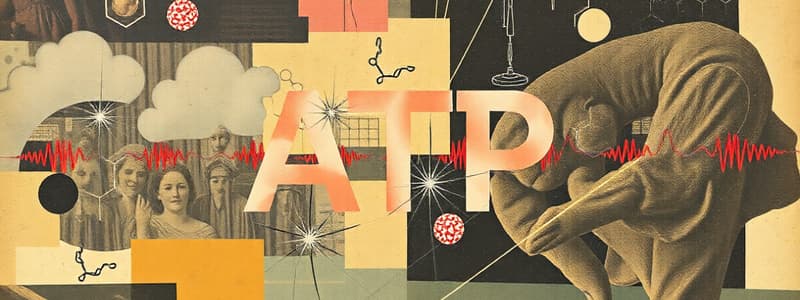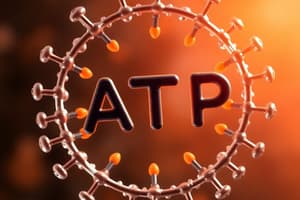Podcast
Questions and Answers
What is the primary function of ATP in the body?
What is the primary function of ATP in the body?
- Building proteins
- Storing genetic information
- Transporting oxygen
- Providing energy for cellular processes (correct)
Which of the following is NOT a type of chemical reaction?
Which of the following is NOT a type of chemical reaction?
- Decomposition
- Hydrolysis (correct)
- Exchange (oxidation-reduction)
- Synthesis
What is the relationship between activation energy and a catalyzed reaction?
What is the relationship between activation energy and a catalyzed reaction?
- Catalyzed reactions increase activation energy, making reactions happen faster.
- Catalyzed reactions lower activation energy, making reactions happen faster. (correct)
- Catalyzed reactions require a higher activation energy.
- Catalyzed reactions have no effect on activation energy.
Why is the active site of an enzyme important?
Why is the active site of an enzyme important?
Which of the following describes a situation where an enzyme is operating at its optimal temperature?
Which of the following describes a situation where an enzyme is operating at its optimal temperature?
Flashcards
ATP
ATP
A molecule that stores and releases energy for cellular processes.
Potential Energy
Potential Energy
Stored energy based on position or state, such as in chemical bonds.
Enzymes
Enzymes
Biological catalysts that speed up chemical reactions in the body.
Reaction Rate
Reaction Rate
Signup and view all the flashcards
Metabolism
Metabolism
Signup and view all the flashcards
Study Notes
ATP Structure and Function
- ATP stores and releases energy
- ATP's structure and function are important
Energy Types
- Potential and kinetic energy relationships
- Relation to Thermodynamics
Types of Chemical Reactions
- Synthesis, decomposition, and exchange reactions (oxidation-reduction)
Reaction Classifications
- Anabolic and catabolic reactions
- Endergonic and exergonic reactions
- Reversible and irreversible reactions
Reaction Rates and Activation Energy
- Reaction rate definition
- Activation energy definition.
- Catalyzed and uncatalyzed reactions.
Enzyme Structure and Function
- Enzymes' role in the human body
- Importance of their structure and function
Enzyme Action Mechanisms
- Active sites and cofactors in enzyme action
- Effects of substrate concentration, temperature, and pH
Enzyme Activity Ranges
- Optimal temperature and pH ranges for enzymes
Enzyme Inhibition
- Competitive and noncompetitive inhibition
Metabolism Overview
- Metabolism definition
- Metabolic pathways and negative feedback examples
Studying That Suits You
Use AI to generate personalized quizzes and flashcards to suit your learning preferences.




